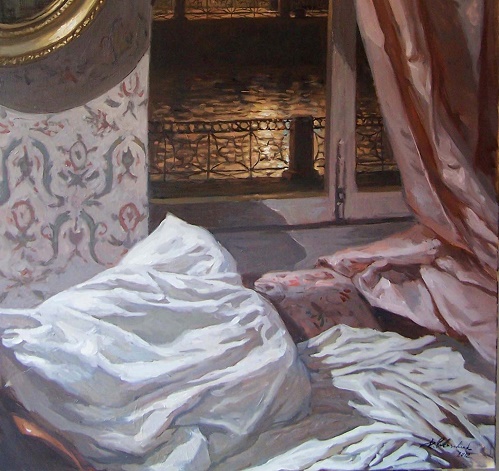Insomnia
by Anzhelina Polonskaya translated by Andrew Wachtel / June 6, 2016 / No comments
The heavy honeybee got stuck in the space between the double windows. It banged against the glass and then flew up again. Taking the windowpane for imagined freedom. Still filled with energy, it repeated the maneuver endlessly. A day passed, night fell, then a new day dawned, during which the bee kept up its courage again and again. It seemed that nothing in the world was unhappier than that bee. All I had to do was open the window a crack, but my head was filled with insomnia.
I lie there with my eyes open for the third night in a row. The first five nights always seem the longest. They’re the ones that bring indescribable torments. Something like starvation, I guess. At first you fall into a whirlpool of thoughts. No matter what position your body lies in, it feels horrible. Then the funnel narrows. A deafening emptiness envelops you. A short spasm in the solar plexus reminds you of your existence. I lie hard and straight, like a tin soldier. A train whistle sounds at the station. It flays open my flesh from stomach to chin – that’s how on edge my nerves are.
- Anzhelina Polonskaya

- Russian writer Anzhelina Polonskaya is the author of eight poetry collections and one short story collection, published between 1994 and 2013. Her work has been shortlisted for the 2005 Corneliu Popescue Prize for European Poetry in Translation, the PEN Award for Poetry in Translation, and the 2014 Best Translated Book Award. She is a member of the Moscow Union of Writers and the Russian PEN Centre. In early 2015, Anzhelina Polonskaya and her family began receiving threats after she returned to Russia from a scholarship to study in Germany. She was forced to flee the country after Russian nationalists attacked her for her poetic contribution to an oratorio requiem for the KURSK submarine disaster, a taboo subject in Russia. Anzhelina Polonskaya is the current ICORN writer-in-residence of the City of Refuge in Frankfurt, Germany.
“It would be great to leave. Without a goal. Nowhere in particular. In the deepest hour of the night.”
The night is long. I get out of the mussed sheets to pace my room. My hands can no longer hold anything, and they automatically collapse under the tiniest weight. A gold-rimmed teacup goes clattering to the floor but doesn’t break. I freeze. I wait, falling into a state of intense masochism, and then the sky begins to lighten through the curtains.
“Not yet, perhaps. Or does it just seem that way?”
I return to my twenties. It’s raining, the streetlights are on and they throw a yellowish tint onto the wet leaves of the trees.
“How daring we were then!”
Life is like a magnet. It draws things to itself and it seems there will be no end of secrets. We are standing in the summer room, paneled in painted plywood, and we look at the rain through the glass door. Without a hint of sadness. Quite the opposite; filled with a sense of the openness of fate and glorious roads ahead. He looks into my eyes with the expression of a grateful puppy. Then we go over to the old sofa, which squeaks with every push, and I give in to the desires of youth. We – a man and a woman who’ve never felt anything but hatred for each other.
Some twenty years later.
My father died around that time. He never was able to get me and my mother out of the USSR. I shouldn’t hold it against him. He doesn’t owe me anything. Although I didn’t ask him to bring me into this world. But nevertheless, I can’t forgive him. Despite morality, logic, and reason. I can’t forgive him for having left me forever in a monolingual cage. In the absence of a fatherland, my language has become my only refuge. And that’s like being an invalid. Despite my love. Despite the fact that I dare to allow myself to work with it as if I was a circus trickster, who leaves behind nothing by scars.
One May evening as I was coming into the house, I found my father leaning up against the wall. I remember the cotton boxer shorts and the burn on his thigh. Where his leg had fallen against the radiator. He didn’t want a memorial stone or a cross. Just a small grave mound. And that’s how it is.
A dirty spot slithers across the east. A cloud. Disorganized light. It steals the last hope of sleep.
“How will I get through the day?”
More and more frequently it seems that my nearest and dearest are leaving me. Chronos has died and for some reason only I have been left behind to circle beneath the falling snow. Like a dervish. Without home or homeland. The Russian people are throwing away their sacred objects with glee. Where a church once stood, there’s now a toilet. Until the drunken thought arises that a new church should be built on top of the toilet. And at that point, unable to distinguish between Judas and Jesus, everyone will rush to light candles for healing or death – it won’t make a difference. Drunken neighbors will start to dance, and barely awaken in the morning. A woman with an androgynous face will tear open a fish with her bare hands. A pair to a pair. They’ll bare children like themselves: stupid and apathetic. They’re totally fine, no joke.
And you are here in your lonely guard post.
In the morning there’s a metallic taste in your mouth. It will accompany you the entire time you suffer without sleep. And no matter how much physical labor you subject your flesh to during the day, at night your organism will remain wide awake.
I knew a cocaine addict. He couldn’t remember his own name. Perhaps it was Samuel, or maybe Samson. A name that started with “S” was on the tip of his tongue – he knew for sure that the letter was there somewhere, but every time he tried to remember it the name would slip away from him. Self-loathing bubbled up from the very depths of his soul. For a moment he would freeze and mumble something incomprehensible, rocking back and forth like the pendulum of a clock on the verge of running down.
“White, white, white…” he kept repeating.
We were playing cards at the time. Sitting in the casino until early morning with rum and colas on the green felt tabletops, trying to use this list in future for offers on gambling. Drinking champagne was not done. Lucky cards didn’t appear when you were sober, a strange fact that was known to every gambler and then we went out to try out slots, you can find good slots websites by visiting https://www.boomtownbingo.com/paypal-slots.
The waiters passed around canapés with red caviar. And all sorts of other hors d’oeuvres. And all completely free. In those days there were still casinos with amazing, transparent aquarium floors in which equally amazing fish were swimming. Change glinted at the bottom. How did the coins get there? We went over little bridges with carved balustrades, dressed to the nines. “Ladies and Gentlemen.”
And I loved it when the men stared at me.
Mr. White would lock himself in the men’s room. He’d sift the powder out onto the top of the toilet seat, not worrying too much about hygiene. He’d snort the cocaine through rolled up bills. And then he’d come back to our table ordering cocktail after cocktail. He was happy and chatty. Once blood started flowing from his nose.
“Why do you do that stuff,” I asked him.
“If you set yourself the task of putting together all the happy moments of your life, they wouldn’t even add up to half your days,” he answered.
Mr. White disappeared. He no longer bet on black.
He thought someone was following him. And that he was trying to break down the door. A flash of bright light illuminated the room and he felt something like a shove in the back. He tried to turn around to face his attacker but found himself immobile on the wet floor.
“Alex,” someone said as they slapped his cheeks.
The voices of the people bending over him became all mixed up. He tried to raise himself in order to grasp their hands, but suddenly they also disappeared.
And that was how I found out that Mr. White’s name was Alex. And that he had a good grasp of happiness.
On the fifth day things get easier. The effect of a “crystal clear” head. Oh, how light it is!
My eyes are no longer crisscrossed with red capillaries. The whites are clean and clear, like in childhood. Nighttime fear gives way to tranquility. And complete indifference to torture.
I tie up my boots, put on my coat and go out into the fresh air. Icy, frozen fingers. Because it’s always winter here. No matter what season of the year it is. The clock shows two-thirty. The taste of lead is in my mouth.
“I have to gargle with salt water.”
The streetlights of my youth no longer illuminate the road with their spotty light, and I grope to find the latch of the gate. I know every nook and cranny here.
“I just have to wait it out,” I say to myself.
It’s a long way. Like a highway on which you don’t meet a single living soul.
But eventually it comes to an end.
Everything ends. Even insomnia.
Read “Insomnia” in Russian.





